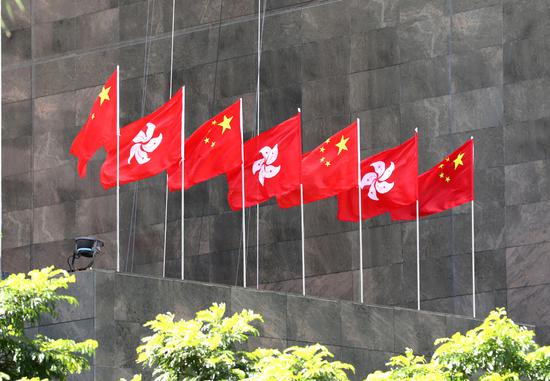Ip sees hegemony, hypocrisy in U.S. law on HK
The United States flaunted its "sheer hypocrisy" by passing the Hong Kong Human Rights and Democracy Act, New People's Party Chairwoman Regina Ip Lau Suk-yee said.
Ip told China Daily the real motive behind the act is to block China's development by using concerns about human rights in Hong Kong as an excuse. The U.S. is trying to take the moral high ground, she said.
Ip said the law is part of a U.S. political plot to undermine China. But she also said she believes America cannot really hurt China much. The act will actually harm the interests of American people and companies doing business in Hong Kong, she added.
"The Hong Kong Act is totally unnecessary and unjustified," she said in an exclusive interview.
"The original bill was introduced into the U.S. Congress in June after the Hong Kong Special Administrative Region government announced it would withdraw the controversial rendition bill. This had been one of the key issues mentioned in the Hong Kong act. So there was really no need to legislate the so-called Hong Kong act,'' she said.
As for Hong Kong's degree of autonomy and the state of its democracy, this is not something U.S. politicians should be making judgments about, the veteran politician said.
Hong Kong is, in fact, freer than the U.S. in many ways, she said. Human rights are fully protected by the Basic Law, and the election of the chief executive and Legislative Council by universal suffrage is promulgated in the Basic Law as the ultimate goal, but to be implemented in a gradual, orderly manner, she added.
Ip noted that the U.S. took more than 100 years to give its people universal suffrage. American women were allowed the right to vote only in 1920, but the U.S. had declared independence in 1776, Ip said.
"It is typical of the U.S. to apply double standards and point a finger at others regardless of its own human rights problems, such as racial discrimination and police brutality," she added.
"They turn a blind eye to the fact that, on average, 1,000 people are shot or killed by police in their country every year, but they criticize Hong Kong police.
"Some visiting U.S. senators stayed in Hong Kong for only a few hours. They were led by separatists Joshua Wong Chi-fung and Denise Ho Wan-sze to protest sites, and they returned home and talked as though they were experts on Hong Kong affairs. This is sheer hypocrisy," she said.
Tech war
Ip also said the Hong Kong act would harm Hong Kong in the future in other ways. There is a clause that will closely examine whether China would abuse Hong Kong's special status under the U.S. export-control regime to transfer high-tech exports to the Guangdong-Hong Kong-Macao Greater Bay Area. Ip believes such export restrictions would harm Hong Kong's long-term technological development.
Discussing Hong Kong'a separate tariffs territory status, she said Hong Kong earned this because of its trade development in the early years and its capacity as a founding member of the World Trade Organization in 1995. Ip stressed that this status was not something granted to Hong Kong by a foreign country.
If Hong Kong's special status were to be revoked, it would not harm the Chinese economy because Hong Kong is too small in terms of China's overall GDP (below 2 percent), she said. The U.S. will instead hurt its own interests in Hong Kong. There are 85,000 American people who live in Hong Kong and more than 1,300 American companies doing business in the city, Ip said.
Now that the Hong Kong act is signed into law, Ip believes the SAR government should react proactively by seeking more government-to-government commercial dialogues. It should also safeguard the integrity of Hong Kong's export control regime. She knows the government is working with the American Chamber of Commerce in the SAR to lobby against implementation of the Hong Kong act.
"The government should also step up its publicity campaigns — not just in the U.S. but globally — to give accurate accounts of the situation in Hong Kong after so many negative things have been said," she said.
Apart from government officials, Executive Council members Bernard Chan, Ronny Tong Ka-wah and Joseph Yam Chi-kwong should also speak out more about Hong Kong, Ip said. They all speak good English and are well known in the international community, she said.

